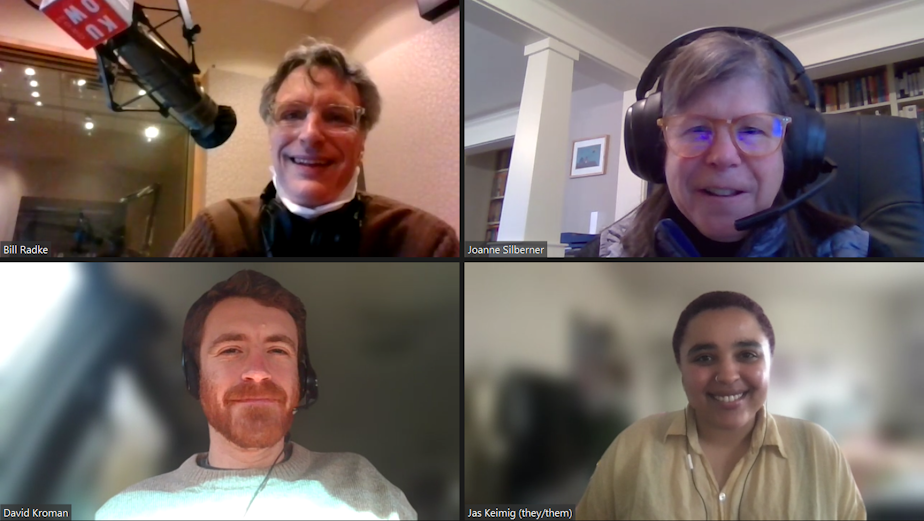Week in Review: Mask mandates, Mazdas stuck on KUOW, and the concrete workers strike

Bill Radke reviews the week's news with freelance journalist Joanne Silberner, Seattle Times transportation reporter David Kroman, and The Stranger staff writer Jas Keimig.
As states from Oregon to New York announce plans to end mask mandates, Washington Gov. Jay Inslee on Wednesday announced that he’s lifting outdoor masking requirements and plans to announce next week a date when the face-covering rules for public indoor spaces and schools will be lifted. The announcement means the state's requirement that masks be worn at outdoor events with 500 or more people will expire at the end of the day Feb. 17.
The CDC is pledged to follow the science, but states are moving ahead. Where does Washington state stand in that? Also, New York Times just posted letters in response to an article calling for compassion for unvaccinated Covid patients. One is from a Seattle man saying that if people have avoided vaccination, they deserve no compassion. How much does being exasperated have to do with this?
Over the past couple of weeks, some people who listen to KUOW in their Mazdas say their car radio is permanently stuck on 94.9 FM. It’s only affecting KUOW, Mazdas from 2016, and we have no idea why. Service managers at three local Mazda dealerships said they’ve been flooded with calls during the last three weeks about this issue. One employee said it’s a sore subject, and they’ve been getting calls about the issue for weeks. How would you react if this happened in your car? Is there a better radio station than KUOW to get stuck on?
As a concrete-mixer driver strike threatens government projects and thousands of construction jobs, King County officials hope an exclusive multimillion-dollar proposal can jump-start talks between six Seattle-area concrete companies and their unionized workers. The county is soliciting bids from concrete companies to become the county’s exclusive suppliers for at least three years. The catch: to qualify, companies need a union contract with their workers. Additionally, if the strike continues, it could significantly delay the opening of the West Seattle bridge. Is that a lot of overreach for the county to step in?
A bill that would allow the Department of Health to regulate magic mushrooms and allow adults to use them in controlled settings will not pass this session, according to state Sen. Jesse Salomon (D-Shoreline), who sponsored the legislation. The proposal, which was based on legislation Oregon adopted last year, would not decriminalize psychedelic mushrooms for personal use. It would, however, give the DOH 18 months to create a bunch of rules around the process of growing mushrooms and selling them to "service centers," where trained and licensed trip-sitters would gently guide people over the age of 21 along the paths of their healing journeys.
Sen. Salomon said members from both parties expressed interest in the bill, and that their concerns centered less on drug use stigma and more on "the mechanics." He mentioned possible issues with the DOH, which might struggle to stand up a new regulatory framework for mushrooms while it has its hands full with Covid. He also said lawmakers wanted to "trouble-spot issues" around the potential for losing federal revenue for providing a safe place for people to use the medicine. Is it done?
Democrats in the Washington Legislature want to spend $16.8 billion over the next 16 years on the state’s transportation system, releasing a proposal Tuesday that would shore up the state’s largest highway projects and promote transit ridership through grants for improved service and free ridership for anyone 18 and under. The proposal also envisions adding four new hybrid-electric boats to the state’s aging ferry fleet, matching available federal dollars to move forward on a high-speed rail project between British Columbia and Oregon and spending nearly $2.5 billion removing barriers to fish passage. What is most important or surprising about this?





